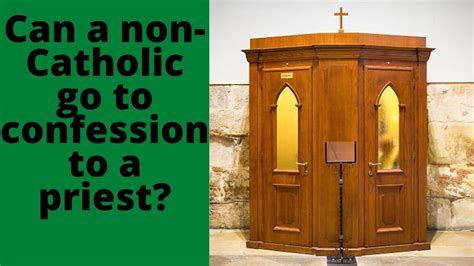Understanding the Sacrament of Confession
Confession, also known as the Sacrament of Reconciliation or Penance, is a rite observed within the Catholic Church. It involves the confession of sins and the reception of forgiveness from a priest. Individuals who are baptized Catholics are encouraged to partake in confession regularly as part of their spiritual journey.

Non-Catholics and the Sacrament of Confession
While confession is primarily intended for Catholics, the question arises as to whether non-Catholics can also go to confession. This article delves into the historical, theological, and practical aspects of this intriguing question.
Historical Perspective
Historically, the practice of confession has evolved within the Catholic Church. In the early Church, public confession was common, but its form has changed over time. The Fourth Lateran Council in 1215 introduced the mandatory annual confession for Catholics. However, it was only during the Counter-Reformation, particularly during the Council of Trent (1545-1563), that the modern form of confession, involving private confession to a priest, became established.
Theological Considerations
The Sacrament of Confession is based on the belief that Jesus Christ has granted authority to the Catholic Church to forgive sins. As non-Catholics are not under the jurisdiction of the Catholic Church, the question arises as to whether they can receive the same forgiveness through confession.
Some theologians argue that non-Catholics can experience God’s forgiveness through other means, such as personal prayer, repentance, and reconciliation with others. They maintain that the Sacrament of Confession is a specifically Catholic rite that is not necessarily applicable to non-Catholics.
Others contend that the act of confession itself has a profound psychological and spiritual benefit, regardless of the specific religious context. They suggest that non-Catholics who seek forgiveness and reconciliation can also partake in confession, even if they do not receive sacramental absolution.
Practical Considerations
In many Catholic parishes, priests are willing to listen to the confessions of non-Catholics. However, it is essential to communicate with the priest beforehand to ensure that they are open to hearing the confession of a non-Catholic.
Non-Catholics who go to confession may not receive sacramental absolution, as this is typically reserved for baptized Catholics. However, the priest may provide guidance, support, and encouragement during the confession.
Conclusion
The question of whether non-Catholics can go to confession is complex and nuanced. While there is no definitive answer, historical, theological, and practical considerations suggest that non-Catholics may benefit from the act of confession, even if they do not receive sacramental absolution.
Non-Catholics who desire to go to confession are encouraged to consult with a priest to discuss their intentions and expectations. The priest can provide guidance and support throughout the process, helping them to experience the spiritual benefits of confession, regardless of their religious affiliation.
